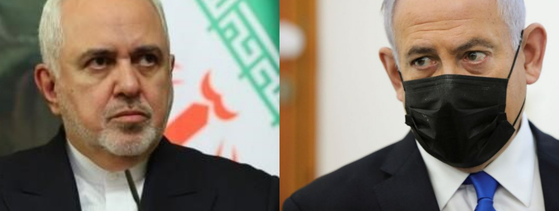Conflicts between Iran and Israel over the attack on Iran’s nuclear facilities are intensifying, and the restoration of the Iranian nuclear agreement (JCPOA, Comprehensive Joint Action Plan), which the United States promoted, is also facing a hurdle.
![On the 12th (local time), Iranian Foreign Minister Mohammad Javad Jarif and Israeli Prime Minister Benjamin Netanyahu raised the level of criticism against each other. [로이터 ‧EPA=연합뉴스]](https://i0.wp.com/pds.joins.com/news/component/htmlphoto_mmdata/202104/13/e0b3b22c-f70c-44f8-8e15-67bd4c5ca0ef.jpg?w=560&ssl=1)
On the 12th (local time), Iranian Foreign Minister Mohammad Javad Jarif and Israeli Prime Minister Benjamin Netanyahu raised the level of criticism against each other. [로이터 ‧EPA=연합뉴스]
According to Iran’s state-run IRNA news agency on the 12th (local time), Iranian Foreign Minister Mohammad Javad Jarif attended the Congressional Security Committee and identified the blackout at the Natanz nuclear facility on the 11th as an Israeli attack. “We will take revenge against the Zionist regime (Israel) to block Iran’s efforts.”
In this regard, the New York Times (NYT) cited an anonymous intelligence official, “I don’t know if you are Israeli or American, but the blackout was caused by remote explosives smuggled into a nuclear facility.” It is a physical attack, not a previously known cyber attack.
Israeli media also said, “The bomb was installed near the main distribution line in Natanz, and about 1,000 people were on duty at the time of the accident.”
Hosein Amir Abdolaan, special adviser for international affairs in Iran’s parliament, told Twitter: “The timing of this event is by no means a coincidence. During the negotiation process, we have often experienced the bloody claws of enemies hidden under velvet gloves.”

Israeli Prime Minister Netanyahu emphasized in a press conference immediately after the meeting on the 12th (local time) that “the mutual cooperation between the United States and Israel is important.” [AP=뉴시스]
On the same day, Israeli Prime Minister Benjamin Netanyahu continued his offensive against Iran. “There is nothing as dangerous as Iran’s fanatical regime in the Middle East, and since they have never given up nuclear weapons, we will stop it.”
US Defense Secretary Lloyd Austin, who is visiting Israel, was present at this meeting. It clearly conveyed to the United States that it cannot accept the restoration of the Iranian nuclear agreement and the ease of sanctions.
![On the 10th, Iranian President Hasan Rohany is listening to an explanation of the new centrifuge from officials from the Atomic Energy Agency at the Natanz nuclear facility in Iran where the accident occurred. [AP=연합뉴스]](https://i0.wp.com/pds.joins.com/news/component/htmlphoto_mmdata/202104/13/b618a1cb-39ef-4d44-b61e-699a3b05e0c8.jpg?w=560&ssl=1)
On the 10th, Iranian President Hasan Rohany is listening to an explanation of the new centrifuge from officials from the Atomic Energy Agency at the Natanz nuclear facility in Iran where the accident occurred. [AP=연합뉴스]
The US is trying to minimize the impact this attack will have on the restoration of the nuclear agreement. White House spokesman Jen Saki drew a line at a briefing on the 12th, saying, “The United States was not involved in any way.”
Earlier, the US State Department announced the resumption of aid to Palestine on the 7th, and was in a state of’making a new plate’ for Middle East policy. The negotiations on the return of the nuclear agreement with Iran also show a different tone from the previous regime, which emphasized’maximum pressure’.
However, Israel, a traditional ally, is in a position that it is difficult to accept the return of the nuclear agreement.
Saudi Arabia’s state-run Arab News said, “Israel has seen how Iran is recognized for its international legitimacy and billions of dollars are being flown into the Iranian army through a nuclear agreement concluded by the Obama administration in 2015. He explained that he also lost faith that he would think of Israel’s position first.”
![Iran's foreign minister meets EU diplomatic and security representatives. [EPA=연합뉴스]](https://i0.wp.com/pds.joins.com/news/component/htmlphoto_mmdata/202104/13/36af7827-fab0-4867-a9ed-85061975fa91.jpg?w=560&ssl=1)
Iran’s foreign minister meets EU diplomatic and security representatives. [EPA=연합뉴스]
Israeli media reported that the weakened political position, including Prime Minister Netanyahu’s de facto defeat in the general election held last month, is the background to divert public opinion.
The U.S. seems to start managing the situation through individual talks with both sides.
On the 12th, U.S. Internet media Axios said that White House national security adviser Jake Sullivan will discuss the Iranian nuclear issue through a video strategy dialogue with Israel’s counterpart, Mayr Ben Shabat, national security adviser. On the same day, the Washington Post (WP) reported that an additional indirect talks between Iran and the United States will be held this week in order not to waste diplomatic efforts so far.
Experts, “The width of the United States is getting narrower”
Ali Baez, the head of the International Crisis Group (ICG) in Iran, said, “I don’t think Iran will give up the nuclear negotiations as Israel intended,” and “this incident narrowed the range of negotiations in Iran.” did.
![The Joe Biden administration is in a position to restore the Iranian nuclear agreement, which was destroyed by former President Donald Trump in 2018 as ``Obama's diplomatic failure''. [AFP·로이터=연합뉴스]](https://i0.wp.com/pds.joins.com/news/component/htmlphoto_mmdata/202104/13/ad7deaab-b629-4b5d-bc5c-2a884094c732.jpg?w=560&ssl=1)
The Joe Biden administration is in a position to restore the Iranian nuclear agreement, which was destroyed by former President Donald Trump in 2018 as “Obama’s diplomatic failure”. [AFP·로이터=연합뉴스]
In Vienna, Austria, a meeting of the Parties aiming to restore the Iranian nuclear agreement has been held since the 6th. At the time of the 6th, the atmosphere was not bad, as Ambassador Mikhail Ulyanov of the Russian delegation commented on Twitter that the meeting of the JCPOA joint committee was successful.
The Iran Nuclear Agreement was signed by Iran in 2015 with the United States, Britain, France, China, Germany, and Russia. Instead of restricting Iran’s nuclear activities, the main goal is to significantly lift US sanctions against Iran. In 2018, former President Donald Trump abolished this as “Obama’s diplomatic failure,” but the Biden administration said it would restore it.
Reporter Kim Hong-beom [email protected]
![]()
